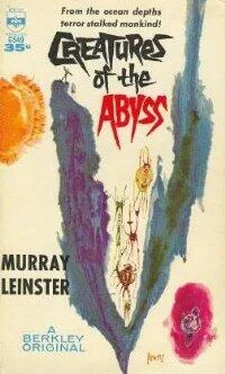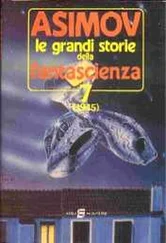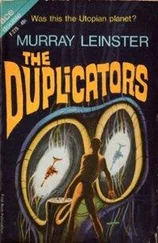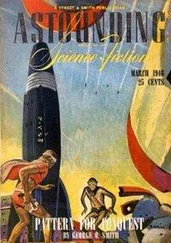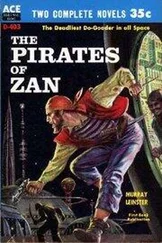Deirdre said, “I told them about the fish-driving business and they want to see. They stopped arguing about last night’s bolide to take ringside seats. All right?”
Terry shrugged. He had the recorder already set up. He’d taken a section of the tape made where the sea was bright, at the place where the loudest of the unpleasant humming noise was recorded. He’d made a loop of it so it would play over and over.
He played the much-amplified sound through the underwater horn held in the air. The result was a raucous bellowing noise. He lowered it into the water. The horn touched the surface and went under.
Instantly, the fish of the lagoon seemed to go crazy. All the surface broke and writhed and splashed. There was an incredible number of fish. Terry turned the horn on one side. In this way, not all the water was filled with the intolerable noise, but only a net-like beam of it raced across the water. Within that line the fish continued to leap frenziedly. The rest of the lagoon suddenly quieted down. In a little while the beam’s space, also, grew quiet. But that was because the fish that had been previously caught in it had escaped.
“I’m afraid,” said Terry, “that this isn’t going to be very entertaining. I’m going to sweep the beam across the lagoon, pushing the fish ahead of it, until I should have them all in one small area.”
It was curious that he felt uncomfortable as he set about his task. But he’d experienced the sensation this sound produced. And it was not very pleasant.
He turned the beam around, slightly. Again, there were sudden splashings. They died away. He turned the beam again. It was a nasty, snarling vibration in the water. So far as fish were concerned, it was more like a wall than a net, because not even the tiniest living creature could penetrate it. Not only fish fled before it. Shrimps and crabs and all types of crustaceans jerked and crawled and swam ahead of its motion. Jellyfish writhed when it touched them. Sea cucumbers contorted themselves. Everything that lived in the lagoon and could swim or crawl or writhe moved before the invisible barrier. Presently, the effect of crowding could be seen, and fish began to leap out of water.
“This is a great advance in civilization,” said Dr. Morton. “Men invented guns and destroyed the buffalo and the passenger pigeon! You may have made it possible to depopulate the sea!”
Terry did not answer. The morning sun shone brightly, a gentle breeze made ripplings on the lagoon, the palms waved their fronds in languid gestures, and the surf could be heard booming and splashing on the outer reef. And about two dozen people stood on the wharf or on the Esperance’s deck and watched a spliced section of recorder-tape go through and through a recorder, which was set to make a sound underwater that could not be heard by the people above.
The fish of the lagoon had crowded themselves into a minor embayment of the shore. There were innumerable leapings there.
“There should be plenty of fish collected now,” said Terry distastefully. “I certainly can*t herd them ashore.”
The outboard boat pushed away from the yacht, its motor roaring. It reached the area in which the water seemed to seethe and surge with the motion of densely-crowded swimming creatures. The people in the boat examined the surrounding water, then the boat came back at top speed.
“They’re there!” called Davis. “And thick enough to walk on! I clearly saw some freaks that must come up from the bottom! We want to collect them!”
“I speared five just now,” Terry told him, “and one of them was wearing this.”
He held up the plastic object he’d found. There was silence for a moment. Then Dr. Morton said briskly, “We’ll want fish spears. We’ll take all the boats and go after some more of these piscatory oddities. Who’s best with a spear?”
Davis would go. He could use the two fish spears that were standard equipment for the outboard. The staff of the tracking station scattered to launch other boats. Only Terry and Deirdre remained on the Esperance. It was necessary for someone to stand by the recorder.
Boats moved away across the water. One stout member of the island’s staff trudged along the shore.
“You’re driving them,” said Deirdre. “You are right.”
“I wish I weren’t,” said Terry.
“Why?”
“You know how these weird fish got here,” he said impatiently. “They were driven here. You know how they’ve been kept here. I experienced that! I told you why they didn’t die when they came up from thousands of fathoms! Now, what’s the only possible purpose for their being here? Put it more scientifically! What is the consequence of these happenings, so that to some biological entity it would be a favorable happening?” His tone was sardonic, at the end.
“I don’t know.”
“Ihope I don’t either,” said Terry dourly.
He was in no amiable mood. He’d made too many guesses like those Davis had mentioned. He was beginning to have less and less hope that they were untrue. Each new development made any imaginable cause of these events just so much more appalling to think about.
In an hour, three boats came back from the small bay into which all the fish of the lagoon had been crowded. Terry turned off the underwater horn. A stout man walked slowly along the shore with a heavy burden of known edible fish. He was the island’s cook, and he had speared them from the beach. The boats, altogether, had speared and captured not less than sixty specimens of fish normally found only many thousand feet below the ocean’s surface. Upon inspection, all of them were found to have deftly punctured swim bladders, punctured with so slender a barb that the opening would close by itself, except when serving for the release of intolerably expanding gas.
Before noon, seven more plastic objects had been found among the deep-sea fish. Three seemed identical to the one Terry had found. Two others were identical to each other but of a different kind, and the last two were of two different types altogether. Only those like the one tested by Terry seemed sensitive to sounds, which they changed into other sounds at a twenty-thousand-cycle frequency, or higher. The rest did nothing that could be detected.
During the afternoon, news came to distract the absorption of the tracking station staff in the lagoon’s fish. The short-wave operator came running to the wharf, waving a written message. The deck of the Esperance was not a pretty sight, just then, with the dissection that had been taking place on it Jug was beginning to flush the debris overside.
The short-wave operator arrived. Dr. Morton read the message. He raised his voice.
“Here’s a fancy one!” he told the assembled company. “Space-radar’s picked up a new object coining in from nowhere. It will probably orbit once before it hits the air and burns. By the line of motion it should pass nearly overhead here. We’re alerted to get it under observation and watch it!” He waved the message in a large gesture. “We’ve got to get ourselves set up! The argument on the path of last night’s bolide and why it fell where it did is again in order. We’ll see what we can do about computing the fall-point of this!”
He headed for the shore. The staff followed, babbling. Somebody’s mathematics would be verified, and with it his views on the possible effects of terrestrial magnetism on objects approaching the earth.
“We ought to get these plastic things to Manila,” Davis said slowly. “They need to be compared to others. But I think we’ll wait and see this bolide first.”
A heated argument started in the tracking station staff. From Dr. Morton downward, almost to the station’s cook, the most varied predictions were made. The official computation from Washington, made from the observed course and height and speed, predicted that the bolide would land somewhere in the South Pacific. Dr. Morton predicted a fall in the China Sea, within a certain precisely stated number of miles from Thrawn Island. Other predictions varied.
Читать дальше
